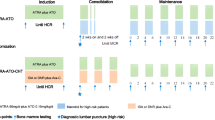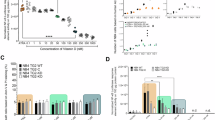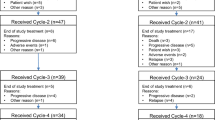Abstract
Front-line treatment with all-trans retinoic acid (ATRA) and arsenic trioxide (ATO) is superior to standard ATRA and chemotherapy (CHT) in patients with low-/intermediate-risk acute promyelocytic leukemia (APL). However, for high-risk (HR) patients (defined as those with a white blood cell count ≥ 10×10⁹/L), the role of ATRA-ATO is subject to debate, and study data are scarce. The objective for the present real-world cohort study was to assess the outcomes in 135 HR APL patients treated with ATRA-CHT or ATRA-ATO during induction at 12 French hospitals between 2010 and 2021. Of the 135 patients, 50 (37%) received ATRA-ATO as induction therapy (though combination with cytoreductive treatment was usually necessary), and 85 received standard ATRA-CHT (“CHT group”). The complete response rates were 90% in the ATRA-ATO group and 76% in the CHT group (p = 0.052). The five-year overall survival (OS) rate was significantly higher in the ATRA-ATO group (89.86% [95% confidence interval: 81.81–98.70]) than in the CHT group (72.69% [63.30–83.47]; p = 0.035). The combination of ATRA and ATO was effective and safe in this large, real-world cohort of HR APL patients. The forthcoming results of the APOLLO trial (a direct comparison of ATRA-ATO with ATRA-CHT) might validate our present findings.
This is a preview of subscription content, access via your institution
Access options
Subscribe to this journal
Receive 12 print issues and online access
$259.00 per year
only $21.58 per issue
Buy this article
- Purchase on SpringerLink
- Instant access to the full article PDF.
USD 39.95
Prices may be subject to local taxes which are calculated during checkout




Similar content being viewed by others
Data availability
Data are available on request.
References
Adès L, Thomas X, Bresler AG, Raffoux E, Spertini O, Vey N, et al. Arsenic trioxide is required in the treatment of newly diagnosed acute promyelocytic leukemia. Analysis of a randomized trial (APL 2006) by the French Belgian Swiss APL group. Haematologica. 2018;103:2033–9.
Burnett AK, Russell NH, Hills RK, Bowen D, Kell J, Knapper S, et al. Arsenic trioxide and all-trans retinoic acid treatment for acute promyelocytic leukaemia in all risk groups (AML17): results of a randomised, controlled, phase 3 trial. Lancet Oncol. 2015;16:1295–305.
Jen W-Y, Marvin-Peek J, Kantarjian HM, Alvarado Y, Borthakur G, Jabbour E, et al. Long-term follow-up of a phase 2 study of all-trans retinoic acid, arsenic trioxide, and gemtuzumab ozogamicin in acute promyelocytic leukemia. Cancer. 2025;131:e35662.
Bewersdorf JP, Prozora S, Podoltsev NA, Shallis RM, Huntington SF, Neparidze N, et al. Practice patterns and real-life outcomes for patients with acute promyelocytic leukemia in the United States. Blood Adv. 2022;6:376–85.
Kayser S, Rahmé R, Martínez-Cuadrón D, Ghiaur G, Thomas X, Sobas M, et al. Outcome of older (≥70 years) APL patients frontline treated with or without arsenic trioxide-an International Collaborative Study. Leukemia. 2020;34:2333–41.
Mitelman F. ISCN: An International System for Human Cytogenetic Nomenclature. S. Karger. Basel, 1995.
Powell BL, Moser B, Stock W, Gallagher RE, Willman CL, Stone RM, et al. Arsenic trioxide improves event-free and overall survival for adults with acute promyelocytic leukemia: North American Leukemia Intergroup Study C9710. Blood. 2010;116:3751–7.
Sanz MA, Montesinos P, Vellenga E, Rayón C, De La Serna J, Parody R, et al. Risk-adapted treatment of acute promyelocytic leukemia with all-trans retinoic acid and anthracycline monochemotherapy: long-term outcome of the LPA 99 multicenter study by the PETHEMA Group. Blood. 2008;112:3130–4.
Muchtar E, Vidal L, Ram R, Gafter-Gvili A, Shpilberg O, Raanani P. The role of maintenance therapy in acute promyelocytic leukemia in the first complete remission. Cochrane Database Syst Rev 2013. https://doi.org/10.1002/14651858.CD009594.pub2.
Döhner H, Wei AH, Appelbaum FR, Craddock C, DiNardo CD, Dombret H, et al. Diagnosis and management of AML in adults: 2022 recommendations from an international expert panel on behalf of the ELN. Blood. 2022;140:1345–77.
Ravandi F, Estey EH, Cortes JE, O’Brien S, Pierce SA, Brandt M, et al. Phase II Study of All-Trans Retinoic Acid (ATRA), Arsenic Trioxide (ATO), with or without Gemtuzumab OzogamIcin (GO) for the Frontline Therapy of Patients with Acute Promyelocytic Leukemia (APL). Blood. 2010;116:1080.
Lancet JE, Moseley AB, Coutre SE, DeAngelo DJ, Othus M, Tallman MS, et al. A phase 2 study of ATRA, arsenic trioxide, and gemtuzumab ozogamicin in patients with high-risk APL (SWOG 0535). Blood Adv. 2020;4:1683–9.
Silva WFda, Rosa LIda, Marquez GL, Bassolli L, Tucunduva L, Silveira DRA, et al. Real-life Outcomes on Acute Promyelocytic Leukemia in Brazil - Early Deaths Are Still a Problem. Clin Lymphoma Myeloma Leuk. 2019;19:e116–e122.
Akcay OF, Yeter HH, Buyukasik Y. Real-life outcomes of unselected acute promyelocytic leukemia patients: a single-center 14-year experience. Rom J Intern Med. 2020;58:138–45.
Rosati S, Gurnari C, Breccia M, Carmosino I, Scalzulli E, Montefusco E, et al. Acute promyelocytic leukemia (APL) in very old patients: real-life behind protocols. Acta Oncol. 2021;60:1520–6.
Fontes HMF, de Freitas JP, Oliveira JHV, de Sousa Moraes ÉA, Rego EM, Melo RAM. Causes and risk factors for early death in adult patients with acute promyelocytic leukemia: a real-life experience. Hematol Transfus Cell Ther. 2024;46:S122–S128.
Sanz MA, Martín G, González M, León A, Rayón C, Rivas C, et al. Risk-adapted treatment of acute promyelocytic leukemia with all-trans-retinoic acid and anthracycline monochemotherapy: a multicenter study by the PETHEMA group. Blood. 2004;103:1237–43.
Voso MT, Guarnera L, Lehmann S, Döhner K, Döhner H, Platzbecker U, et al. Acute Promyelocytic Leukemia: Long-Term Outcomes from the HARMONY Project. Blood 2024; blood.2024026186.
Salamero O, Martínez-Cuadrón D, Sobas M, Benavente C, Vives S, De la Serna J, et al. Real life outcomes of patients aged ≥75 years old with acute promyelocytic leukemia: experience of the PETHEMA registry. Leuk Lymphoma. 2019;60:2720–32.
Lehmann S, Ravn A, Carlsson L, Antunovic P, Deneberg S, Möllgård L, et al. Continuing high early death rate in acute promyelocytic leukemia: a population-based report from the Swedish Adult Acute Leukemia Registry. Leukemia. 2011;25:1128–34.
Montesinos P, Bergua JM, Vellenga E, Rayón C, Parody R, De La Serna J, et al. Differentiation syndrome in patients with acute promyelocytic leukemia treated with all-trans retinoic acid and anthracycline chemotherapy: characteristics, outcome, and prognostic factors. Blood. 2009;113:775–83.
Lo-Coco F, Avvisati G, Vignetti M, Thiede C, Orlando SM, Iacobelli S, et al. Retinoic acid and arsenic trioxide for acute promyelocytic leukemia. N Engl J Med. 2013;369:111–21.
Platzbecker U, Adès L, Montesinos P, Ammatuna E, Fenaux P, Baldus C et al. First results of the APOLLO trial: a randomized phase III study to compare ATO combined with ATRA versus standard AIDA regimen for patients with newly diagnosed, high-risk acute promyelocytic leukemia. EHA Library. 06/13/2024; 422206; S102.
Funding
This research did not receive any specific funding from agencies or organizations in the public, commercial, or not-for-profit sectors.
Author information
Authors and Affiliations
Contributions
LA and DL designed the study; DL and AD collected, controlled the database and analyzed data; BC, MH, SB, CB, AZ, ML, CB, ND, CW, MPGH, MO, TC, FC, AC, CR, MHB, ER, PF included and treated patients; AD performed the statistical analysis; AD, LA and DL wrote the manuscript. All authors revised the manuscript for critical content and approved the submitted version.
Corresponding authors
Ethics declarations
Competing interests
The authors report no conflicts of interest. The authors alone are responsible for the manuscript’s content.
Ethics approval and consent to participate
The study was conducted in accordance with the Declaration of Helsinki. The study protocol was approved by the French National Consultative Committee on Information Processing in Medical Research (Comité Consultatif sur le Traitement de l’Information en matière de Recherche dans le domaine de la Santé, Paris, France; reference: 15.414), and the study database was registered with the French National Data Protection Commission (Commission nationale de l’informatique et des libertés, Paris, France; reference: DR-2015-534). Informed consent was obtained from all participants.
Additional information
Publisher’s note Springer Nature remains neutral with regard to jurisdictional claims in published maps and institutional affiliations.
Rights and permissions
Springer Nature or its licensor (e.g. a society or other partner) holds exclusive rights to this article under a publishing agreement with the author(s) or other rightsholder(s); author self-archiving of the accepted manuscript version of this article is solely governed by the terms of such publishing agreement and applicable law.
About this article
Cite this article
Lebon, D., Da Rocha, A., Cassinat, B. et al. Comparison of induction with arsenic trioxide or chemotherapy in a real-world cohort of patients with high-risk acute promyelocytic leukemia. Leukemia 39, 1865–1870 (2025). https://doi.org/10.1038/s41375-025-02663-x
Received:
Revised:
Accepted:
Published:
Version of record:
Issue date:
DOI: https://doi.org/10.1038/s41375-025-02663-x



